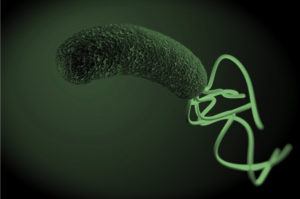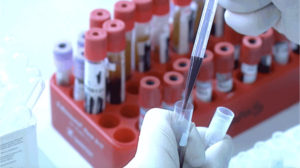Helicobacter Pylori Infection Samples
Bay Biosciences provides high quality, clinical grade fresh frozen cryogenically preserved biopsy tissue samples with matched sera (serum), plasma and peripheral blood mononuclear cells (PBMC) biofluid samples from patients diagnosed with Helicobacter Pylori (H. Pylori) infection.
The sera (serum), plasma and PBMC biofluid samples are processed from patient’s peripheral whole-blood following customized collection and processing protocols. The specimens are collected from unique patients with Helicobacter pylori (H. pylori) infection and provided to a valued pharmaceutical customer for drug diagnostics, research, development and discovery.

Helicobacter Pylori Infection Overview
Helicobacter Pylori (H. Pylori) is a is a gram-negative bacteria which causes chronic inflammation (infection) in the stomach and duodenum. H. Pylori is contagious and causes ulcers, these bacterium are also called ulcer bacteria. Helicobacter Pylori bacterium causes chronic inflammation (gastritis) by attacking the lining of the stomach and producing a cytotoxin called vacuolating cytotoxin A (Vac-A) leading to formation of ulcers. H. Pylori bacterium also is considered a common cause of ulcers worldwide; as many as 90% of people with ulcers are infected with H. pylori. Most H. Pylori infected individuals have no symptoms, other infected individuals may have occasional episodes of abdominal pain, nausea, vomiting, bloating, belching and fatigue.
H. Pylori bacterium adapts to live in the harsh, acidic environment of the stomach. These bacteria can change the environment around them and reduce its acidity so they can survive. The spiral shape of H. pylori allows them to penetrate into the stomach lining, where they’re protected by mucus and the body’s immune are not able to reach them. The bacteria can interfere with the immune response and ensure that they’re not destroyed. This can lead to serious stomach problems.
Helicobacter Pylori (H. Pylori) usually happens during childhood. It is a common cause of peptic ulcers. These germs can enter the body through food, water, contaminated utensils etc., and live in the digestive tract. You can also pick up the bacteria through contact with the saliva or other body fluids of infected people. After many years, they can cause sores, called ulcers, in the lining of the stomach or the upper part of the small intestine. If the H. pylori infection and ulcers are not treated and eradicated, some patients infection can lead to MALT lymphoma (stomach cancer)
Once H. pylori enters the persons body, it attacks the lining of the stomach (mucosa), which usually protects the stomach from the acid the body uses to digest food. Once the bacteria have done enough damage, acid can get through the lining of the stomach (mucosa), which leads to ulcers. These may bleed, cause infections, or keep food from moving through your digestive tract.
Helicobacter pylori creates chronic infections and weakens the natural defenses of the stomach therefore most patients with symptoms are treated to prevent ulceration formation in the stomach. Helicobacter pylori infection is also resistant to most antibiotics and therefore difficult to get rid of from the stomach. Treatment may require multiple type of antibiotics along with proton pump inhibitors (PPIs)

It is unknown how exactly H. Pylori infects someone, the H. Pylori bacteria may be passed from person to person through direct contact with saliva, vomit or fecal matter. H. Pylori infection may also be spread through contaminated food or water.
Signs and Symptoms of H. Pylori Infection
Most patients with H. Pylori infection do not have any signs or symptoms of the disease, but in some patients following signs and symptoms may occur:
- An ache or burning pain in the abdomen
- Abdominal pain that’s worse on empty stomach
- Bad breath (halitosis)
- Excessive Burping
- Anemia
- Diarrhea
- Nausea
- Loss of appetite
- Frequent burping
- Fever
- Bloating
- Weight loss
- Dark stools
- Decreased appetite
- Heartburn
Causes of H. Pylori Infection
It is not known exactly how H. Pylori infections spread. The bacteria have coexisted with humans for thousands of years. The infections are thought to spread from one person’s mouth to another. They may also be transferred from feces to the mouth. This can happen when a person does not thoroughly was their hands after using the bathroom. H. Pylori can also spread through contact with contaminated water or food.
Prevention of H. Pylori Infection
Most of the world’s population (over 50%) is infected with H. Pylori infection and there is no vaccine available against H. pylori to prevent either colonization or infection H. pylori. In the United States H. Pylori is more common in Hispanics and blacks compared to the white population. Since the treatment and prevention of side effects and complications of the disease is difficult, H. Pylori patients are recommended to take measures to prevent developing ulcers. These prevention measures include:
- Avoiding Smoking
- Avoiding Alcohol consumption
- Avoid caffeine
- Avoid Stress
- Maintain good hygiene
Diagnosis of H. Pylori Infection
Helicobacter pylori can be diagnosed by conducting physical exam and diagnostic tests, these include blood antibody tests, urea breath tests, stool antigen tests and endoscopic biopsy.
Detailed clinical data, including biomarker information including endoscopy and other diagnostic test results are provided. In addition biopsy & pathology annotations, with the patients history associated with the Helicobacter Pylori infection samples is provided to a valued customer for drug discovery, development and research. The sera (serum), plasma and PBMC) biofluid samples were processed using customized protocols provided by the researcher.
Bay Biosciences is a global leader in providing researchers with high quality, clinical grade, fully characterized human tissue samples, bio-specimens and human bio-fluid collections from cancer (tumor) tissue, cancer sera (serum), cancer plasma, cancer PBMC and human tissue samples from most other therapeutic areas and diseases.
Bay Biosciences maintains and manages it’s own bio-repository, human tissue bank (biobank) consisting of thousands of diseased samples (specimens) and from normal healthy donors available in all formats and types. Our biobank procures and stores fully consented, deidentified and institutional review boards (IRB) approved human tissue samples and matched controls.
All our human human tissue collections, human specimens and human bio-fluids are provided with detailed samples associated patient’s clinical data. This critical patient’s clinical data includes information relating to their past and current disease, treatment history, lifestyle choices, biomarkers and genetic information. Patient’s data is extremely valuable for researchers and is used to help identify new effective treatments (drug discovery & development) in oncology, other therapeutic areas and diseases. This clinical information is critical to demonstrate their impact, monitor the safety of medicines, testing & diagnostics, and generate new knowledge about the causes of disease and illness.
Bay Biosciences banks wide variety of human tissue samples and biological samples including cryogenically preserved -80°C, fresh, fresh frozen tissue samples, tumor tissue samples, FFPE’s, tissue slides, with matching human bio-fluids, whole blood and blood derived products such as serum, plasma and PBMC’s.
Bay Biosciences is a global leader in collecting and providing human tissue samples according to the researchers specified requirements and customized, tailor made collection protocols. Please contact us anytime to discuss your special research projects and customized human tissue sample requirements.
Bay Biosciences provides human tissue samples (human specimens) from diseased and normal healthy donors; including peripheral whole-blood, amniotic fluid, bronchoalveolar lavage fluid (BAL), sputum, pleural effusion, cerebrospinal fluid (CSF), serum (sera), plasma, peripheral blood mononuclear cells (PBMC’s), saliva, Buffy coat, urine, stool samples, aqueous humor, vitreous humor, kidney stones, renal calculi, nephrolithiasis, urolithiasis and other bodily fluids from most diseases including cancer. We can also procure most human bio-specimens and can do special collections and requests of human samples that are difficult to find. All our human tissue samples are procured through IRB approved clinical protocols and procedures.
In addition to the standard processing protocols Bay Biosciences can also provide human plasma, serum, PBMC bio-fluid samples using custom processing protocols, you can buy donor specific sample collections in higher volumes and specified sample aliquoting from us. Bay Biosciences also provides human samples from normal healthy donors, volunteers, for controls and clinical research, contact us Now.
日本のお客様は、ベイバイオサイエンスジャパンBay Biosciences Japan またはhttp://baybiosciences-jp.com/contact/までご連絡ください。


